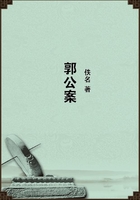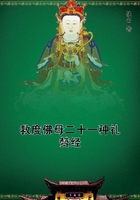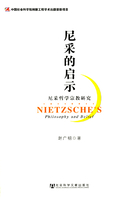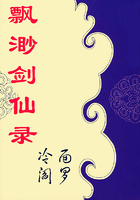But with that personal action her sense of triumph passed away. As her body sank down her soul seemed to sink down with it into bottomless depths of blackness where no light had ever been, into an underworld, airless, peopled with invisible violence. And it seemed to her as if it was her previous flight upward which had caused this descent into a place which had surely never before been visited by a human soul. All the selflessness suddenly vanished from her, and was replaced by a burning sense of her own personality, of what was due to it, of what had been done to it, of what it now was. She saw it like a cloth that had been white and that now was stained with indelible filth. And anger came upon her, a bitter fury, in which she was inclined to cry out, not only against man, but against God. The strength of her nature was driven into a wild bitterness, the sweet waters became acrid with salt. She had been able a moment before to say to Androvsky, almost with tenderness, "Now at last you can pray." Now she was on her knees hating him, hating--yes, surely hating--God. It was a frightful sensation.
Soul and body felt defiled. She saw Androvsky coming into her clean life, seizing her like a prey, rolling her in filth that could never be cleansed. And who had allowed him to do her this deadly wrong? God.
And she was on her knees to this God who had permitted this! She was in the attitude of worship. Her whole being rebelled against prayer.
It seemed to her as if she made a furious physical effort to rise from her knees, but as if her body was paralysed and could not obey her will. She remained kneeling, therefore, like a woman tied down, like a blasphemer bound by cords in the attitude of prayer, whose soul was shrieking insults against heaven.
Presently she remembered that outside Androvsky was praying, that she had meant to join with him in prayer. She had contemplated, then, a further, deeper union with him. Was she a madwoman? Was she a slave?
Was she as one of those women of history who, seized in a rape, resigned themselves to love and obey their captors? She began to hate herself. And still she knelt. Anyone coming in at the tent door would have seen a woman apparently entranced in an ecstasy of worship.
This great love of hers, to what had it brought her? This awakening of her soul, what was its meaning? God had sent a man to rouse her from sleep that she might look down into hell. Again and again, with ceaseless reiteration, she recalled the incidents of her passion in the desert. She thought of the night at Arba when Androvsky blew out the lamp. That night had been to her a night of consecration. Nothing in her soul had risen up to warn her. No instinct, no woman's instinct, had stayed her from unwitting sin. The sand-diviner had been wiser than she; Count Anteoni more far-seeing; the priest of Beni-Mora more guided by holiness, by the inner flame that flickers before the wind that blows out of the caverns of evil. God had blinded her in order that she might fall, had brought Androvsky to her in order that her religion, her Catholic faith, might be made hideous to her for ever. She trembled all over as she knelt. Her life had been sad, even tormented. And she had set out upon a pilgrimage to find peace. She had been led to Beni-Mora. She remembered her arrival in Africa, its spell descending upon her, her sensation of being far off, of having left her former life with its sorrows for ever. She remembered the entrancing quiet of Count Anteoni's garden, how as she entered it she seemed to be entering an earthly Paradise, a place prepared by God for one who was weary as she was weary, for one who longed to be renewed as she longed to be renewed. And in that Paradise, in the inmost recess of it, she had put her hands against Androvsky's temples and given her life, her fate, her heart into his keeping. That was why the garden was there, that she might be led to commit this frightful action in it. Her soul felt physically sick. As to her body--but just then she scarcely thought of the body. For she was thinking of her soul as of a body, as if it were the core of the body blackened, sullied, destroyed for ever. She was hot with shame, she was hot with a fiery indignation. Always, since she was a child, if she were suddenly touched by anyone whom she did not love, she had had an inclination to strike a blow on the one who touched her. Now it was as if an unclean hand had been laid on her soul. And the soul quivered with longing to strike back.
Again she thought of Beni-Mora, of all that had taken place there. She realised that during her stay there a crescendo of calm had taken place within her, calm of the spirit, a crescendo of strength, spiritual strength, a crescendo of faith and of hope. The religion which had almost seemed to be slipping from her she had grasped firmly again. Her soul had arrived in Beni-Mora an invalid and had become a convalescent.
It had been reclining wearily, fretfully. In Beni-Mora it had stood up, walked, sung as the morning stars sang together. But then--why? If this was to be the end--why--why?
And at this question she paused, as before a great portal that was shut. She went back. She thought again of this beautiful crescendo, of this gradual approach to the God from whom she had been if not entirely separated at any rate set a little apart. Could it have been only in order that her catastrophe might be the more complete, her downfall the more absolute?
And then, she knew not why, she seemed to see in the hands that were pressed against her face words written in fire, and to read them slowly as a child spelling out a great lesson, with an intense attention, with a labour whose result would be eternal recollection:
"Love watcheth, and sleeping, slumbereth not. When weary it is not tired; when straitened it is not constrained; when frightened it is not disturbed; but like a vivid flame and a burning torch it mounteth upwards and securely passeth through all. Whosover loveth knoweth the cry of this voice."















